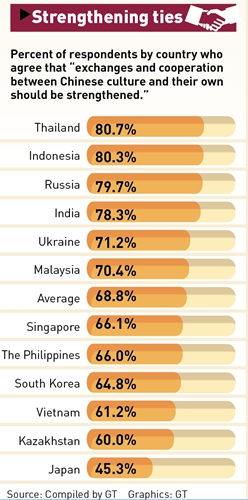ARTS / CULTURE & LEISURE
Survey explores strength of bonds between China and its neighbors
Ties that bind

Photo: VCG
On Monday, China's cultural authorities published the results of a survey exploring people outside China's thoughts on the concept of "building a community with a shared future for mankind" and cultural exchanges. The survey revealed that people in most countries are willing to strengthen cultural exchanges and cooperation with China, while traveling to China was the preferred way for respondents to understand and experience Chinese culture.The survey was carried out by the Chinese National Academy of Arts and the Global Times Research Center among people in 12 countries that have frequent cultural exchanges with China such as Russia, Japan, South Korea and Kazakhstan.
A total of 3,334 people responded to the survey. Data from respondents, all of whom have at least an undergraduate degree, show that nearly 70 percent agree that "exchanges and cooperation between Chinese culture and their own should be strengthened." By country, agreement was highest among respondents in Thailand, Indonesia, Russia and India (78.3-80.7 percent) while that among Japanese respondents was the lowest at 45.3 percent.

Source: Compiled by GT Graphics: GT
Low enthusiasmThe survey shows that in terms of attitude toward cultural exchanges, the two East Asian countries - Japan and South Korea - have very different opinions than other countries. More respondents were willing to see European and American culture be introduced to their home countries than those willing to see the introduction of Chinese culture.
According to the survey, the main reasons a majority of South Korean and Japanese respondents did not want Chinese culture to be introduced into their home countries are "conflicting national ideology or political stances," "Chinese culture has an air of superiority, so it is difficult to communicate with it on an equal footing" and "Chinese culture is very different and so difficult to resonate with."
The survey did reveal that Japanese and South Korean's love for Chinese cuisine was greater than other facets of culture, but their overall interest in Chinese culture was not as high as that of other countries.
Lian Degui, a professor at the School of Japanese Studies in Shanghai International Studies University, told the Global Times that although many Japanese know that much of their culture originated from China, they believe their culture has formed its own "uniqueness." Moreover, the "China containment policy" that has spread in Japan has made many Japanese concerned that their country's culture will be absorbed and assimilated by Chinese culture.
Passion for culture
Compared with Japan and South Korea's comparatively negative response, Indian interviewees showed high enthusiasm for understanding and experiencing Chinese culture through various means, with the top two ways being traveling to China (64.3 percent) and watching Chinese movies (59.7 percent).
Chinese scenic spots related to Buddhism, ethnic folk customs, Chinese history, the ancient Silk Road and Confucian culture were the top five most popular tourist destinations among Indian respondents.
Documentaries on traditional Chinese culture such as military history and art, as well as movies about modern Chinese culture and themes about Indian students in China were the favorites of respondents.
Dev Raturi, an Indian living in China for more than 15 years, told the Global Times that he has seen many young Chinese and Indians visiting each others' countries due to growing trade, new business models and opportunities in various fields including medicine and technology.
"We have seen a lot of Indians from various backgrounds and trades staying in China, including myself, which has led to increased awareness about great destinations, institutes, art and culture in China and in turn this has attracted a lot of young people to explore China," said Raturi.
"We also saw recent bitterness in both countries due to the border standoff, but I am hopeful that our relationship will be strengthened in the near future," he added.
According to the survey, the percentage of respondents that have "the desire to introduce Chinese culture to India" (55.7 percent) is almost the same with the percentage of those that have "the desire to introduce culture from Europe and the US to India" (56.7 percent), the main reason being stated that Indians "have a strong curiosity and interest in Chinese culture."
Zheng Changling, deputy director of the Cultural Development Strategy Center at the Chinese National Academy of Arts and the head of the survey, told the Global Times China and India share many similarities when it comes to development. Based on China's current achievements, India has a strong desire to cooperate with China and learn from its experience. Also, as the two ancient civilizations have long had cultural exchanges, it makes sense for Indians to have such a passion for Chinese culture.
Zheng suggested that China strengthen multi-level and multi-dimensional cultural exchanges with other countries, as "when we respect and understand each other, political and religious issues can be easily resolved."




